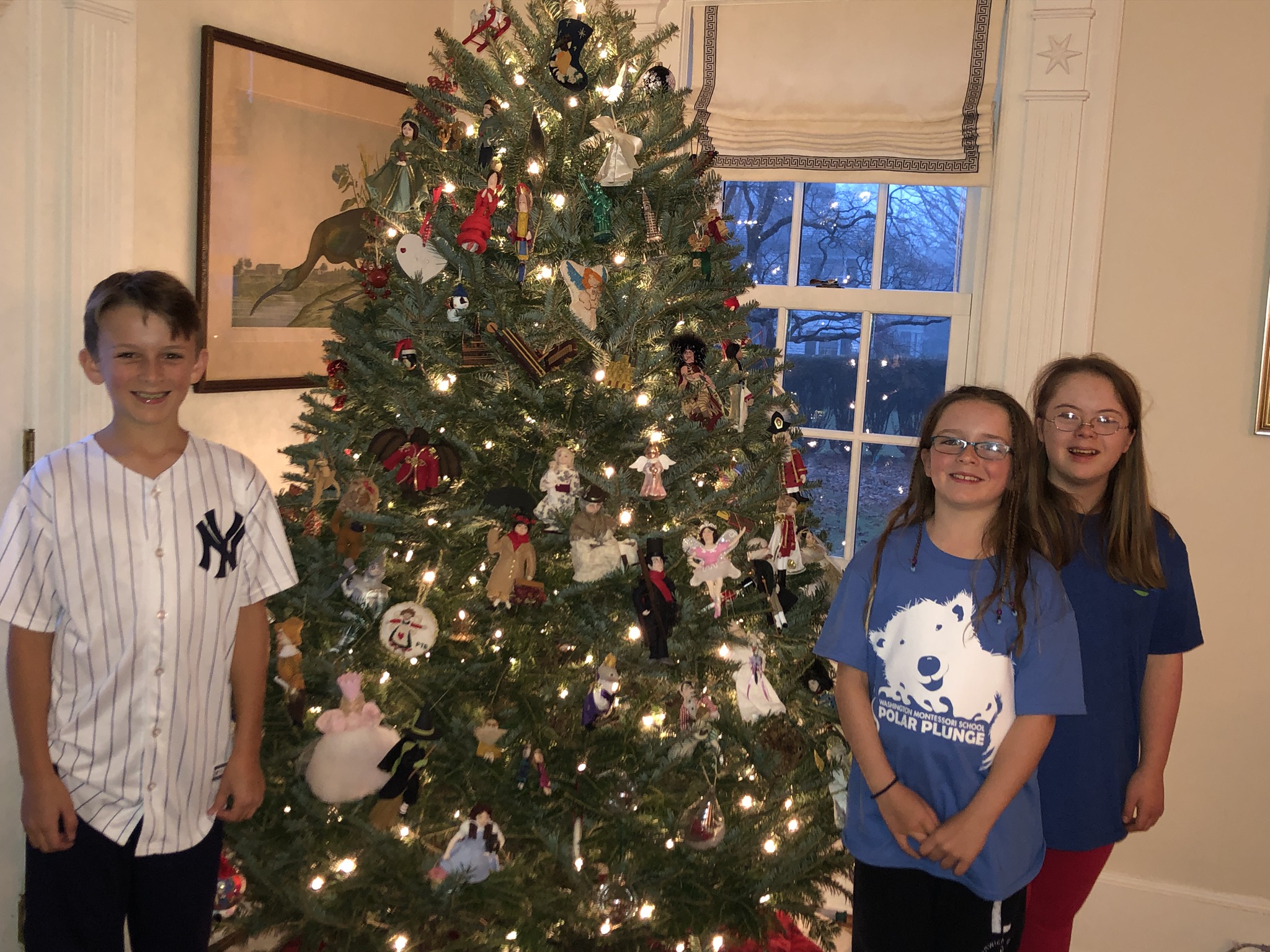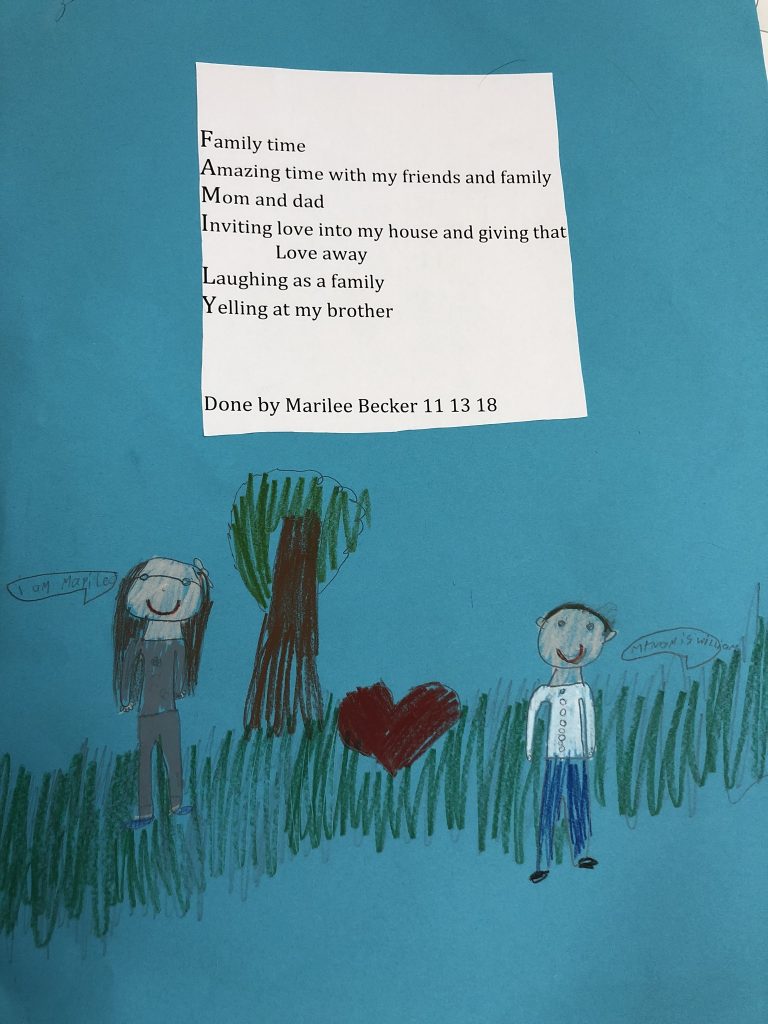
We had Marilee’s parent/teacher conference yesterday morning. We heard about her leadership in the classroom and the play she is writing with her friend Nathan. She’s kind to the other kids. She loves math. And she loves writing–especially acrostic poems.

At the end of our time together, her teacher pulled out one poem written to the theme of FAMILY. It begins as expected–sweet and happy, something any child of the 21st century might write and share on social media. As it continues, it builds to a crescendo of perfect-family-ness with the line “Inviting love into my house and giving love away.” I must admit my heart swelled when I read it, and I thought, Maybe we are doing something right as parents!
And then I read the conclusion: “Laughing as a family. Yelling at my brother.”
The end.
I love this poem.
Why? I love it because it isn’t the fake version of our family–I love it because it represents who we are. We are family that laughs and yells. We are a family that sometimes thinks nasty thoughts about other people. We are a family that prays for other people. We are a family with high ideals and expectations and also a family that recently watched the movie Major League together (definitely NOT one for the seven-year old!). We screw up sometimes, we get it right sometimes. We laugh. We yell.
Family is often on my mind this time of year. The time between Thanksgiving and Christmas is rife with decisions about which family members we want (or are obligated?) to see. For so many of us, going home for the holidays means walking back into old patterns of teenage petulance, codependency, resentment, and snarky remarks toward siblings. We laugh. We yell.
I’ve taken comfort in an unusual Biblical text as I’ve thought about our little band of dysfunctional human trying (and often failing) to love each other, love God, love our neighbors. As I wrangle with extended family about who is going where on what day, who is disagreeing with who about how the presents should be purchased, who is offending who by not staying long enough or staying too long, or who is worried about this person’s drinking problem and that person’s parenting and that one’s passive aggressive nature–in the midst of it all, I take comfort in Jesus’ family tree.
The Gospel of Matthew begins with a rendering of Jesus’ lineage that ends with Joseph. While this is a list of names I am tempted to skip past, I have been pausing to consider them and the truth they offer: Jesus came from a dysfunctional family. He emerged out of people who yelled at each other. He, light and life, came from people who betrayed one another, who had adulterous affairs, and who turned their back on God.
Furthermore, these weren’t just Jesus’ distant relatives. Jesus was born as an illegitimate son, to an unmarried mother, with a human father who had considered divorce. Jesus was born as an outcast from society, with parents who seem to have been cut off from their family. It seems likely that the rest of the clan thought Joseph and Mary were delusional, since they claimed that God himself had put a stamp of approval on what seemed to be Mary’s obvious sexual sin.
So in the midst of the intrigue and rumors, Jesus is born. Jesus, the one who will “save the people from their sins.” The one who fulfills the promise that God will be with us. God will be with us in the laughter and the yelling, in the sin and in the glory.
I take great comfort and great hope that Jesus can be born in our midst day after day. That light and life and salvation, good news for us and for all people, can enter into our dysfunction and pain, enter into our extended family’s dysfunction and pain, enter into our world’s dysfunction and pain. Advent is a season of waiting, a season of longing, a season of anticipation.
In the midst of the argument over who needs to sit next to Aunt Gertrude and listen to her stories, the pain over loved ones who aren’t here to gather around the table, the unhealthy decisions about food and drink, the glitz and glitter and spending too much and caring too much about appearances, Jesus promises to be God with us. He promises to welcome us, as we are, into the family of God.
If you are looking for more reflections like this one during this Advent season, sign up to receive my free Advent ebook here (scroll down to the bottom of the page).
If you haven’t already, please subscribe to my newsletter to receive regular updates and news. You can also follow me on Facebook, Instagram and Twitter.




This Post Has 3 Comments
beautifully written
I found this page because I started thinking about just how much the early biblical families were messed up. If they were around today they would be on Jerry Springer’s TV program.
keep writing . . . . as you already know . . . you have found your God given niche.
This article helps to know and remember that Jesus and God in one another understands the human being of all of us we sometimes forget and we feel sinful all the time do to us being sinful and not perfect. Not that we should use this as an excuse but it sure helps to know that God understands.
Praise God
I researched Jesus and dysfunctional family and found myself here. Beautifully written piece